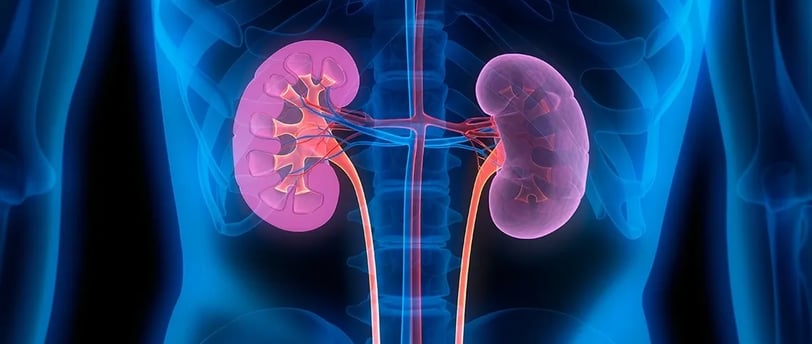Kidney Failure
Kidney failure occurs when either one or both kidneys lose their ability to function independently. Causes may include diabetes, hypertension, and acute kidney injuries. Symptoms encompass fatigue, nausea, swelling, altered urinary frequency, and cognitive impairment. Treatment options consist of dialysis or undergoing a kidney transplant.
HEALTH
3/12/20253 min read


Kidney failure occurs when either one or both kidneys lose their ability to function independently. Causes may include diabetes, hypertension, and acute kidney injuries. Symptoms encompass fatigue, nausea, swelling, altered urinary frequency, and cognitive impairment. Treatment options consist of dialysis or undergoing a kidney transplant.
What is kidney failure?
Kidney failure (renal failure) means one or both of your kidneys no longer function well on their own. Kidney failure is sometimes temporary and develops quickly (acute). Other times it’s a chronic (long-term) condition that slowly gets worse.
Kidney failure is the most severe stage of kidney disease. It’s fatal without treatment. If you have kidney failure, you may survive a few days or weeks without treatment.
What do the kidneys do?
Your kidneys are bean-shaped organs about the size of your fist. They sit under your ribcage, toward your back. Most people have two working kidneys, but you can live well with only one kidney as long as it’s working correctly.
Kidneys have several jobs. One of the most important jobs is helping your body eliminate toxins. Your kidneys filter your blood and send waste products out of your body in urine (pee).
When your kidneys don’t work correctly, waste products build up in your body. If this happens, you’ll feel sick and eventually die without treatment. Many people can manage kidney failure with the proper treatment.
Who does kidney failure affect?
Kidney failure can affect anyone. However, you may be at a higher risk of developing kidney failure if you:
Have diabetes.
Have high blood pressure (hypertension).
Have heart disease.
Have a family history of kidney disease.
Have abnormal kidney structure.
Are Black, Hispanic, Native American, Alaska Native or First Nation.
Are over 60.
What are the first warning signs of kidney failure?
Many people experience few or no symptoms in the early stages of kidney disease. However, chronic kidney disease (CKD) may still cause damage even though you feel fine.
CKD and kidney failure symptoms vary between people. If your kidneys aren’t working properly, you may notice one or more of the following signs:
Extreme tiredness (fatigue).
Nausea and vomiting.
Confusion or trouble concentrating.
Swelling (edema), particularly around your hands, ankles or face.
Peeing more often.
Cramps (muscle spasms).
Dry or itchy skin.
Poor appetite or food may taste metallic.
How is kidney failure diagnosed?
Blood tests. Blood tests show how well your kidneys remove waste from your blood. A provider will use a thin needle to withdraw a small amount of blood from a vein in your arm. Technicians will then analyze your blood sample at a lab.
Urine tests. Urine tests measure specific substances in your pee, such as protein or blood. You’ll pee into a special container at a provider’s office or a hospital. Technicians will then analyze your urine sample at a lab.
Imaging tests. Imaging tests allow a provider to look at your kidneys and the surrounding areas to identify abnormalities or blockages. Common imaging tests include kidney ultrasound, CT urogram and MRI.
Dialysis
Dialysis helps your body filter blood. There are two types of dialysis:
Hemodialysis. In hemodialysis, a machine regularly cleans your blood for you. Most people get hemodialysis three to four days a week at a hospital or dialysis clinic.
Peritoneal dialysis. In peritoneal dialysis, a provider attaches a bag with a dialysis solution to a catheter in your abdominal lining. The solution flows from the bag into your abdominal lining, absorbs waste products and extra fluids and drains back into the bag. Sometimes people can receive peritoneal dialysis at home.
Kidney transplant
A surgeon places a healthy kidney in your body during a kidney transplant to take over for your damaged kidney. The healthy kidney (donor organ) may come from a deceased donor or a living donor. You can live well with one healthy kidney.
